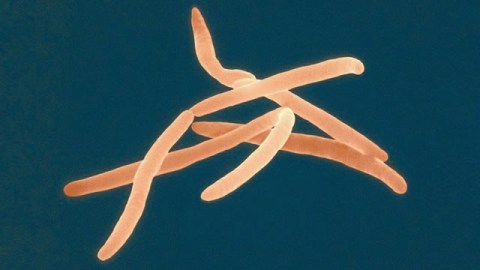Colorectal Cancer: A Bacterial Disease?

Worldwide, it’s estimated that 16% of cancers are microbiological in etiology, which is to say the cancers are almost certainly due to viruses or bacteria. Helicobacter pylori (a bacterium of the stomach), hepatatis B and C viruses, and human papilloma virus are (between them) thought to have caused just under 2 million cancers worldwide in 2008. And this is not even counting the cancers caused by aflatoxins (extremely carcinogenic poisons produced by Aspergillus flavus and other fungi).
If recent research is correct, it appears we may now be able to add another major cancer to the list of neoplastic diseases caused by a microbe. Colorectal cancer, which is on the rise in all developed countries and many developing ones, may turn out to be caused by a bacterium, an extraordinarily tiny bug called Fusobacterium nucleatum (pictured above).
Scientists have suspected for some time that microbial dysbiosis, a disequilibrium of “good” versus “bad” colon bacteria, might play a role in colorectal carcinogensis. (See also this paper.) However, it wasn’t until this summer, with the publication of papers in Cell Host & Microbe, Volume 14, Issue 2, 207-215, 14 August 2013 and PLoS ONE 8(1): e53653 (full version online here) that the link between Fusobacterium and colorectal cancer acquired smoking-gun status.
In their Cell Host & Microbe paper, Kostic et al. report:
We find that Fusobacterium spp. are enriched in human colonic adenomas relative to surrounding tissues and in stool samples from colorectal adenoma and carcinoma patients compared to healthy subjects. Additionally, in the ApcMin/+ mouse model of intestinal tumorigenesis, Fusobacterium nucleatum increases tumor multiplicity and selectively recruits tumor-infiltrating myeloid cells, which can promote tumor progression. Tumors from ApcMin/+ mice exposed to F. nucleatum exhibit a proinflammatory expression signature that is shared with human fusobacteria-positive colorectal carcinomas.
The “smoking gun” came in a second paper in Cell Host & Microbe by Rubinstein et al. that traced Fusobacterium‘s carcinogenic properties to a particular protein, the FadA adhesin, which is produced by no other gut bacterium. Rubenstein’s group found that the bacterium’s FadA protein binds to a specific region of the (normal) E-cadherin protein that maintains cell and tissue junctions. According to the authors:
FadA binds to E-cadherin, activates β-catenin signaling, and differentially regulates the inflammatory and oncogenic responses. The FadA-binding site on E-cadherin is mapped to an 11-amino-acid region. A synthetic peptide derived from this region of E-cadherin abolishes FadA-induced colorectal cancer (CRC) cell growth and oncogenic and inflammatory responses. The FadA gene levels in the colon tissue from patients with adenomas and adenocarcinomas are >10–100 times higher compared to normal individuals. The increased FadA expression in CRC correlates with increased expression of oncogenic and inflammatory genes. This study unveils a mechanism by which Fusobacterium nucleatum can drive CRC and identifies FadA as a potential diagnostic and therapeutic target for CRC.
If the scientists’ work is borne out, it means that there are now a variety of new possibilities for attacking CRC (at least in those cases where F. nucleatum is involved). It might be possible to develop a phage (viral) vector that can silence the FadA gene in Fusobacterium using antisense-gene technology. Alternatively, there may be probiotic formulations that can “drown out” Fusobacterium by not giving it a chance to compete for nutrients with normal bacteria. It may be possible to somehow immunize the human intestinal system against Fusobacterium. Or knock out Fusobacterium with antibiotics. Obviously, the latter would be a clumsy shotgun approach that would also wipe out many useful microorganisms. However, imagine a technique involving sterilizing the gut with antibiotics and other agents, followed by reintroduction of “healthy stool” into the gut (the so-called fecal-transplant technique), restoring normal flora and eliminating dysbiosis.
The point is, based on these recent breakthroughs we now have several possible new ways to go after Fusobacterium, a bacterium that does seem to play a causal role in colorectal cancer.
I might add one other thought. Fusobacterium is known to be a dominant organism in the periodontum. And periodontal disease is known to correlate with cancer. So if you want to reduce your risk of colorectal cancer, you might do well to cut down on alcohol, red meat, and other aspects of the western diet that are known to be associated with colon cancer; and you might just want to buy yourself a big bottle of mouthwash. For all we know, the mouth (not the colon) is where Fusbacterium gets its start. Why not kill it at the source?





